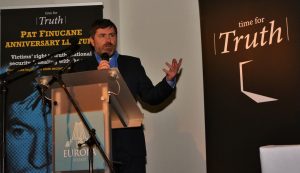
Statement released by RFJ’s Mark Thompson this morning regarding disclosed comments by former Head of local civil service Kenneth Bloomfield
Speaking following comments made by former head of the North’s civil service, Ken Bloomfield, concerning the people of west Belfast which have appeared in archive documents released this week and reported on in the media today RFJ Director Mark Thompson, who heads the region wide organisation supporting people killed through state violence and collusion, issued the following statement:
‘These comments are indicative of an overall approach by the British that sought to demonise the west Belfast community and its wonderful people throughout the conflict. This was precisely the type of language conducive and enabling of a wider NIO and London led policy of structural discrimination, the creation of pseudo killer gangs that were armed with intelligence, weapons and safe passage to kill the people of west Belfast. Indeed Ken Bloomfield was also part of a policing, military and political meeting, also attended by the SoS, as far back as 1972 that argued for the need to ‘indemnify’ British soldiers from prosecution for shootings including fatal shootings of citizens in communities ‘… harbouring gunmen and bombers’ (official gov document uncovered by RFJ 2012 and on RFJ website).This clearly shows an agenda of supporting a campaign of direct state violence including state sponsored violence being waged against the community overall of which west Belfast suffered disproportionally from with the use of rubber and plastic bullets, the use of lethal force, summary executions, shoot to kill, and collusion – all carried out with impunity. Ken Bloomfield not only owes the people of west Belfast an apology. His commentary and the accompanying context of what was actually visited on the entire west Belfast community in terms of killings, injuries and associated human rights violations, harms and abuses requires examination with accountability as part of a wider truth process.’ Ends









